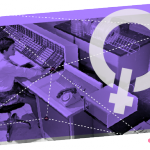Posts Tagged “LAC”
Juventud en la Internet: la voz que necesita ser escuchada
by Digital Rights LAC on April 8, 2016

El Observatorio de la Juventud es un proyecto que reúne a cuarenta jóvenes de diferentes nacionalidades. Con una participación activa de todos, este proyecto tiene como propósito atender las necesidades de identificación e inclusión de la participación de los jóvenes en foros, workshops y otros eventos, tanto de carácter nacional como internacional, todos ellos relativos a la Gobernanza de Internet. Esto, en función de que sirva como apoyo para las responsabilidad que los jóvenes precisan asumir en la participación y creación de una Internet justa.
El “derecho al olvido” y los derechos humanos en América Latina y el Caribe: imprecisiones conceptuales, imprecisiones históricas
by Digital Rights LAC on April 8, 2016

Entre los temas más recientes relacionados con el régimen de los derechos fundamentales de los ciudadanos está la posibilidad de exigir legalmente a la eliminación de ciertos registros relativos a un individuo. Esta pretensión de dar forma legal a los procesos de producción de memoria en Internet ganó el nombre de “derecho al olvido”. Esta noción puede causar distanciamiento por cuestionar las bases del sistema de derechos humanos –y sus pretensiones universalistas– montado en los últimos 70 años.
¿Cómo se verifica que yo soy yo en Internet? Una mirada a los proyectos de identificación electrónica en la región
by Digital Rights LAC on April 8, 2016

A medida que aumenta la penetración de Internet y se incrementan los trámites que el gobierno nos ofrece por este medio, aumenta el problema para definir cuáles son los procesos válidos para la autenticación electrónica de usuarios, su identificación y las firmas electrónicas de documentos que se requieren en los diferentes trámites. Sobre todo porque en el mundo crece la suplantación y el robo de identidad asociados a fraudes.
¿Está América Latina preparada para los riesgos del Big Data?
by Digital Rights LAC on April 8, 2016

El sector empresarial y los gobiernos latinoamericanos han recibido con entusiasmo el fenómeno del Big Data. Mucho se ha dicho sobre como el tratamiento masivo y automatizado de datos a través de algoritmos podría implementarse en distintos rubros a fin de mejorar la productividad de los negocios, permitir a los gobiernos mejorar la administración del sector público y ayudar a las organizaciones a diseñar su planificación estratégica. Lamentablemente, el uso abusivo y las consecuentes vulneraciones a los derechos fundamentales que puede producir un uso indiscriminado de esta herramienta no ha recibido el mismo nivel de atención.
Redes comunitarias: Internet desde la primera milla
by Digital Rights LAC on April 8, 2016

Estamos acostumbrados a mirar Internet desde arriba hacia abajo, desde lo más grande a lo más pequeño, desde el proveedor hacia el usuario. Existe otra mirada posible, que es la de Internet como verdadera red de pares. Para esta mirada, lo más importante está en los extremos y no en las conexiones. De la misma manera que una autopista que atraviesa un territorio no tiene sentido por sí misma, sino por las poblaciones que interconecta, en un paisaje digital que revaloriza los extremos, son las personas y no los cables que las conectan, lo que se convierte en el foco de atención.
AbreLatam/ConDatos: the Latin America’s open data community
by Digital Rights LAC on October 27, 2015

The regional meeting revolving open data -who invites public in general, government officials, academics, entrepreneurs and journalists- had their third edition; now the challenges are present in different ways, but they move forward one step at a time.
Hacking Patriarchy: the first #femhack experience
by Digital Rights LAC on July 14, 2015

Many feminists are using the new technologies to promote and defend women’s rights, many women are becoming involved in technology projects: developing companies, writing codes, running online businesses, maintaining blogs on diverse subjects, keeping diary videos; the question remains: what can we do to bring them together?
Toward freer lands on the Internet
by Digital Rights LAC on April 6, 2015

Internet Service Providers in Latin America are increasing data plans that include free access to certain popular applications or not involving consumption of data plan. The “zero rating” arrived in the region and not all are happy.
Women: Strengthening communication on the Internet to improve rights
by Digital Rights LAC on April 6, 2015

After four years working as an advocate of sexual and reproductive rights, Lorena M., had already gathered quite an experience for the type of insults that could come across her path in meetings and public events. But she never thought her life would get dangerously complicated when anonymous hands hacked the defenders’ network site and began receiving insults and threats of all kinds in her e-mail and social networks’ accounts.
Derechos Digitales and LAC: the agenda for 2015
by Digital Rights LAC on February 26, 2015

Since the year is beginning, it is common to make predictions regarding the topics that will govern the agenda of public policies. I dare to predict the topics that, according to my intuition, will raise the biggest debates within our region. By Eduardo Bertoni, CELE*. I want to start mentioning (…) Leer Artículo »
The challenges of criminal investigations in the age of Internet
by Digital Rights LAC on January 30, 2015

Prosecuting crimes often involves the practice of intrusive measures in the sphere of intimacy and privacy of individuals. This fact becomes even more complex when it touches our own personal communications on the Internet. Are Latin America’s procedural systems ready to face these challenges? By J. Carlos Lara, Derechos Digitales. (…) Leer Artículo »
What transparency standards should we demand from States using surveillance technologies?
by Digital Rights LAC on September 30, 2014

The news that Germany sells surveillance technologies, without proper licensing to Argentina, Chile and Mexico, reveals the urgent need for putting pressure on the state to balance the comprehendable need for public safety with respecting the human rights of its citizens. By Francisco Vera, Derechos Digitales*. Undoubtedly, the biggest news (…) Leer Artículo »





